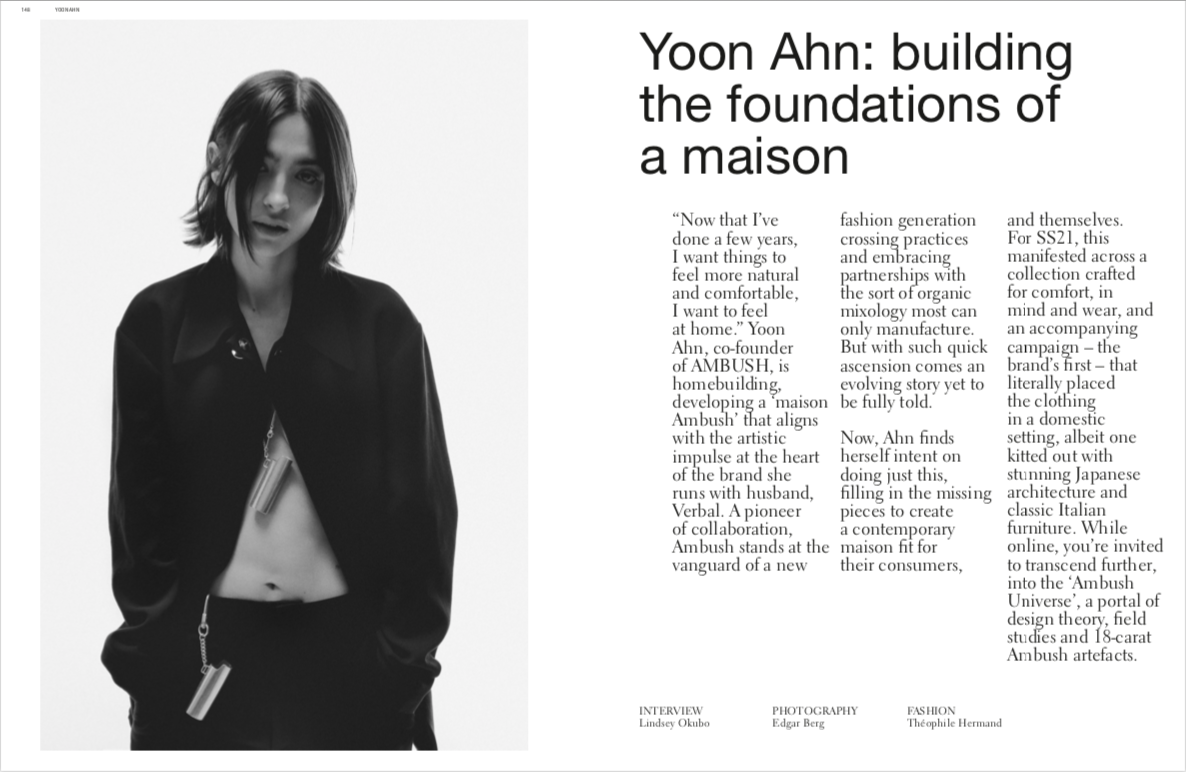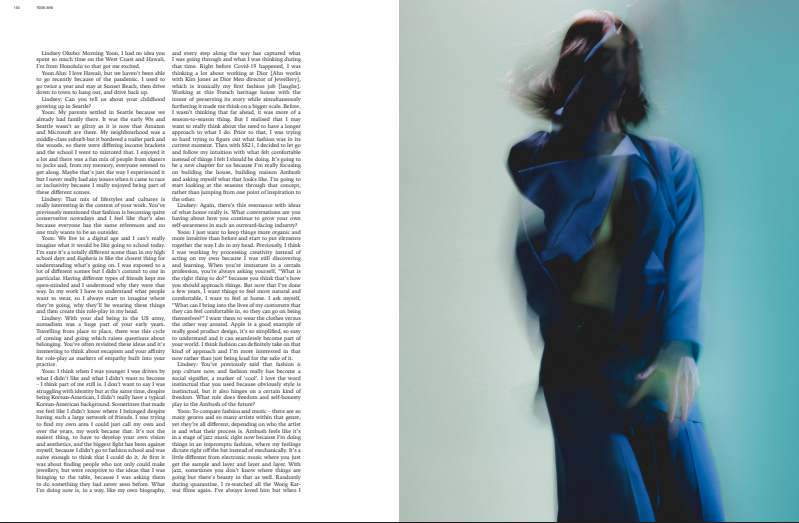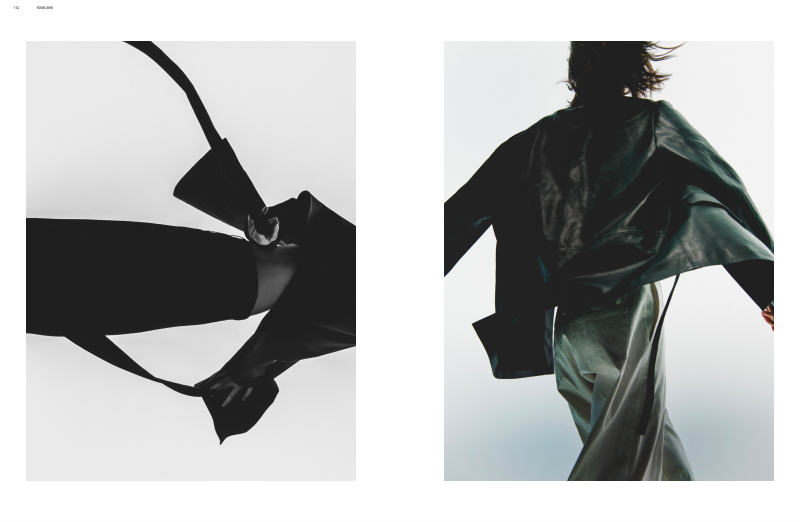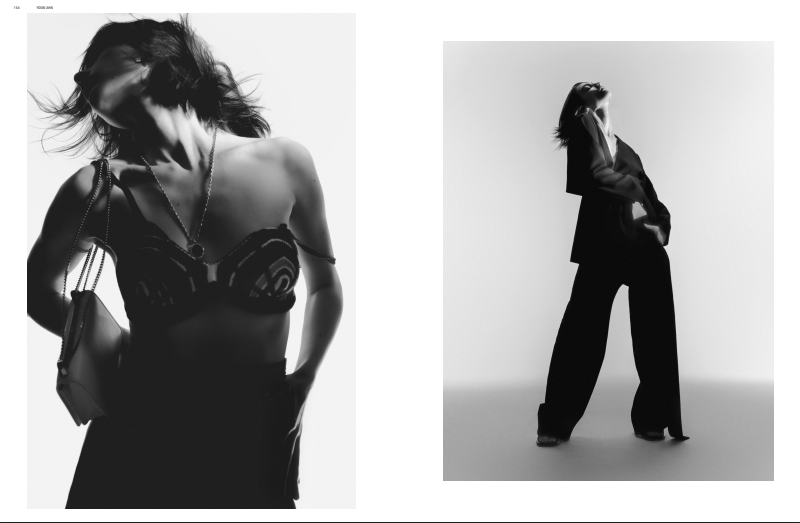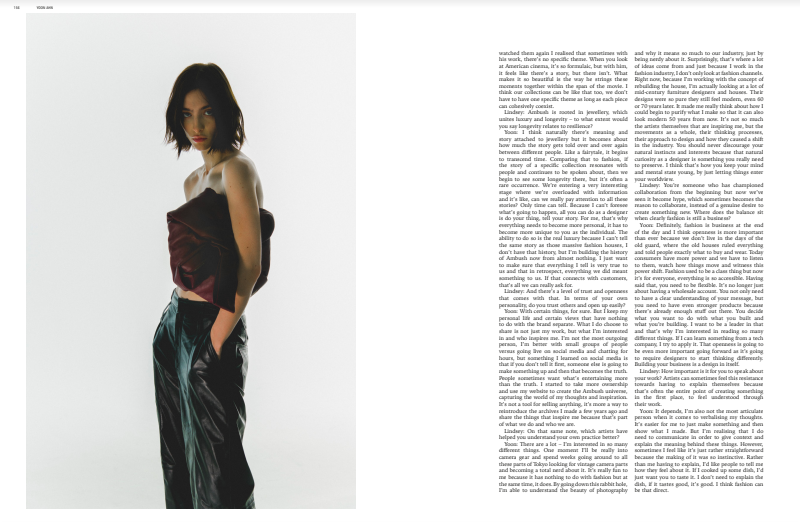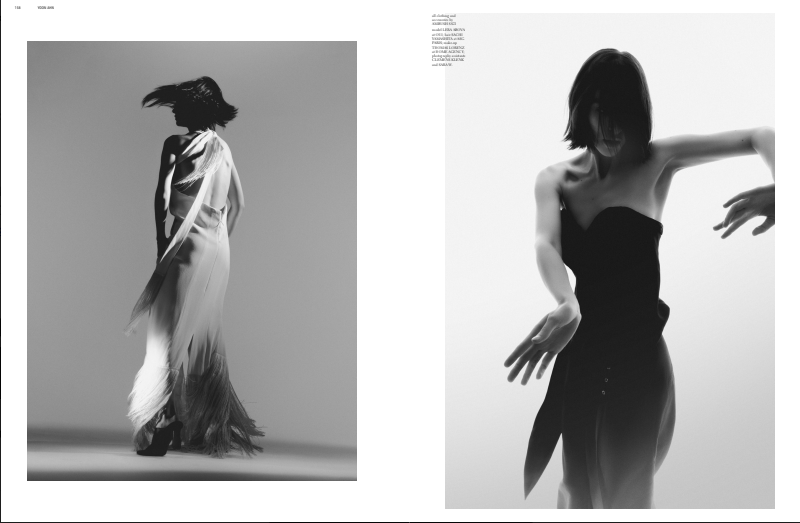Published in print in Heroine 14: Instinct, SS21
https://hero-magazine.com/article/188004/yoon-ahn-outlines-her-vision-of-the-ambush-house/
We wear our instincts like scars, scattered across our subconscious and woven into our own inevitability, we accept their latency as we do prayers, or ghosts, a silent potentiality that guides. Raised by immigrants on United States Army bases up and down the West Coast before settling in a pre-tech bro Seattle, Yoon Ahn’s childhood laid a foundation for navigating flux. She grew up in a middle class suburb near the woods, in a town probably similar to the ones that you and I might call home. She discovered i-D and other fashion publications while working at the public library. She went to college for graphic design on the East Coast and met her husband, Verbal, while at church. She never had any formal education in fashion and yet, she has ascended.
As the co-founder and creative director of AMBUSH and the jewelry designer of Dior Homme, Yoon is just now pivoting to face her own reflection after almost two decades working in the industry. A pioneer of collaboration and member of what has been called the “Antwerp 6 of the Instagram generation,” Yoon sits at the helm of today’s aesthetics alongside her friends Virgil Abloh, Kim Jones and Kanye West. Together they have infiltrated the old guard and rewrote its code by engineering hype and watching it mutate then evolve, simultaneously rendering fashion synonymous with pop culture. The influence Yoon wields is unquestionable but the question she is looking to answer is how to turn AMBUSH into its own Maison, like the greats who have come before her have done. She’s unshackling her own intuition and turning a new chapter at AMBUSH, one that is synonymous with building a home. 24-carat self-expression is the new luxury.
Lindsey: Morning! I had no idea you spent so much time on the West Coast and in Hawaii, I’m from Honolulu so that little snippet got me excited [laughs]. Can you tell us a little more about your childhood?
Yoon: I love Hawaii but we haven’t been able to go because of the pandemic. I used to go twice a year and stay at Sunset Beach and then drive down to town to hang out and then drive back up.
Lindsey: Can you tell us a little more about your childhood?
Yoon: Even when we lived in Korea, I frequently visited the Army base so I was already exposed to so many different types of people and finally when my parents decided to move, they settled in Seattle because we already had family there. It was the early 90s and Seattle wasn't as glitzy as it is now that Amazon and Microsoft are there. My neighborhood was a middle class suburb but it bordered a trailer park and the woods so there were differing income brackets and the school I went to mirrored that. I enjoyed it a lot and there was a fun mix of people from skaters to jocks and from my memory of it, everyone seemed to get along. Maybe I myself was like that so that’s the way I experienced it but I never really had any issues when it came to race or inclusivity because I really enjoyed being part of these different scenes.
Lindsey: Wow no way! I guess diving in then, nowadays subculture has become mainstream and before we even had counterculture, there was the avant garde and I feel like what people forget about that is there's this level of alienation that kind of comes with that. For you as a designer, we’re seeing the entirety of the industry referencing these pockets of culture but often, without any depth. You’ve mentioned that fashion is becoming quite conservative nowadays and I feel like that’s also because everyone has the same references and no one truly wants to be an outsider.
Yoon: We live in a digital age and I can't really imagine what it would be like going to school today. I’m sure it’s a totally different scene than in my high school days and Euphoria is like the closest thing for understanding what’s going on. I was exposed to a lot of different scenes and even if I didn't commit to that scene, just having different types of friends kept me open and I understood why they were that way. In my work I have to understand what people want to wear so I always start to imagine where they’re going, why they’ll be wearing these things and create this roleplay in my head.
Lindsey: Yeah and nomadism was a huge part of your early days, there was this cycle of coming and going and that alone is often enough to raise questions about belonging while challenging your abilities to adapt, read people and carve out space for yourself. Sometimes the latter only comes with escape and as you were working at the public library and discovering things like i-D for the first time, these notions of being elsewhere entered your worldview. For your AW21 collection, you’re revisiting these ideas and it’s perhaps interesting to think about escapism and your affinities for roleplay as matters of empathy inherently built into your practice.
Yoon: I think when I was younger, I was driven by what I didn’t like and what I didn’t want to become and I think part of me still is. I don’t want to say I was struggling with identity but at the same time, despite being Korean-American, I didn’t really have a typical Korean-American background. Sometimes that made me feel like I didn't know where I belonged despite having such a large network of friends. I was trying to find my own area that I could just call my own and over the years, my work became that. It’s not the easiest thing to have to develop your own vision and aesthetics and the biggest fight I’ve had to put up was against myself because I didn't go to fashion school and was naive enough to think that I could do it. At first it was about finding people who not only could make jewelry but were receptive to the ideas that I was bringing to the table because I was asking them to do something they had never seen before. What I’m doing now is in a way like my own biography and every step along the way has captured what I was going through and what I was thinking during that time.
Right before COVID happened, I was thinking a lot about working at Dior which is ironically my first fashion job [laughs], but just working at this French Heritage House with the intent of preserving its story while simultaneously furthering it, made me think on a bigger scale. Before I wasn't thinking that far ahead, it was more of a season to season thing and I realized that I may want to really think about the need to have a longer approach to what I do. Prior to that I was like trying so hard trying to figure out what fashion was in its current moment and then with SS21, I decided to let go and go with my intuition and with what felt comfortable instead of with the things that I thought I should be doing. It's gonna be a new chapter for us because I’m really focusing on building the house, building Maison AMBUSH and asking myself what that looks like. I'm gonna start looking at the seasons more through that concept rather than jumping from one point of inspiration to the other.
Lindsey: Right and especially with the idea of Maison AMBUSH, again there is this resonance with these ideas of what home really is to you. Because your work is autobiographical to an extent, I imagine this question is at the forefront of your mind as so much of home has to do with identity. What are the conversations that you’re having with yourself and how you continue to grow your own self-awareness in such an external facing industry?
Yoon: I just want to keep things more organic and more intuitive than before and start to put elements together the way I do in my head. Previously I think I was working by processing creativity instead of acting on my own because I was still discovering and learning. When you’re immature in a certain profession, you’re always asking yourself what is the right thing to do because you think that's how you should approach things but now that I’ve done a few years, I want things to feel more natural and more comfortable, I want to feel at home. The comfort that I’m talking about is not necessarily just the fit of the clothes but the mental state of what comfort means. I feel more comfortable as a designer and for AMBUSH, I want that to reflect in the clothes in a way that addresses the duality of fantasy and pragmatism in fashion. I lean more towards the pragmatic side because that's just who I am, but at the same time, we all wake up in the morning and we all get dressed but our reality’s are subjective. I ask myself what can I bring into the lives of my customers that they can feel comfortable in so that they can go on being truly themselves? I want them to wear the clothes versus the other way around. Apple is a good example of really good product design, it’s so simplified, so easy to understand and it can seamlessly become part of your world. I think fashion can definitely take on that kind of approach and I'm more interested in that now rather than just being loud for the sake of being loud.
Lindsey: It's funny because we associate so much of fashion with self expression but how much of that “self-expression” is really an honest reflection of yourself? The network of people around you that have been a part of your career since day one include the likes of Virgil, Kanye and obviously, Kim Jones. People have referred to you all as the “Antwerp 6 of today’s generation” and you are the makers of hype, flexing its power. You’ve said that fashion is pop culture now, and fashion really has become a social signifier, a marker of “cool” versus a medium for self-expression. I love the word instinctual that you used because obviously style is instinctual, but it also hinges on a certain kind of freedom. What role does freedom and self-honesty play in the AMBUSH of the future? How are you exploring boundaries and frontiers?
Yoon: To compare fashion and music -- there are so many genres and so many artists within that genre that comprise the sound. Yet, they’re all different, depending on who the artist is and what their process is. AMBUSH feels like it’s in a stage of jazz music right now because I’m doing things in an impromptu fashion, when my feelings dictate right off bat instead of mechanically. It’s a little different from electronic music where you just get the sample and layer and layer and layer, with jazz, sometimes you don’t know where things are going but there’s beauty in that as well.
Randomly during quarantine, I rewatched all the Wong Kar Wai films again. I love him and I’ve always loved him but especially when I watched them again I realized that sometimes with his work, there’s no specific theme. When you look at American cinema, it’s so formulaic but with him, it feels like there’s a story, but there isn’t. What makes it so beautiful is simply the way he strings these moments together within the span of the movie. I think our collections can be like that too, we don't have to have one specific theme as long as each piece can cohesively coexist.
Lindsey: Totally and you’ve spoken about wanting the foundation of your work to be rooted in joy but it’s also jewelry which coalesces with luxury and longevity. To what extent does longevity have to do with resilience?
Yoon: I think naturally there's a meaning and a story attached to jewelry but it becomes about how much the story gets told over and over again between different people. Like a fairy tale, it begins to transcend time. Comparing that to fashion, if the story of a specific collection resonated with people and it keeps getting talked about then we begin to see some longevity there but it’s often a rare occurrence. We're entering a very interesting stage where we're overloaded with information and it’s like, can we really pay attention to all these stories? Only time can tell. Because I can’t foresee what's going to happen, all you can do as a designer is to do your thing, tell your story. For me, that's why everything needs to become more personal, it has to become more unique to you as the individual. The ability to do so is the real luxury because I can’t tell the same story as these massive fashion houses. I don’t have that history but I’m building the history of AMBUSH now from almost nothing. I just want to make sure that everything that I tell is just very true to us and that in retrospect, everything we did meant something to us. Hopefully if that connects with customers, then that’s all we can really ask for.
Lindsey: And as things become more personal, there’s this level of trust that you have to be willing to extend to potential customers who are essentially strangers around the globe, you have to be willing to give of yourself. For you as a person, do you trust others and open up easily?
Yoon: Yeah with certain things I am for sure but I think my personal life and views on certain things that have nothing to do with the brand, I keep separate. What I do choose to share is not just my work because it is a part of me.That’s what I want to share along with what I'm interested in, who inspires me and all these types of things. I'm not the most outgoing person, I'm better with small groups of people versus going live on social media and chatting for hours, but something I learned on social media is that if you don't tell it first yourself, someone is going to make something up and then that becomes the truth. People sometimes want what’s entertaining more than the truth. I started to take more ownership and use my website and created the AMBUSH Universe to capture the world of my thoughts and inspiration. It’s not a tool for selling anything but it’s more so a way to reintroduce the archives I made a few years ago to share the things that inspire me because that's part of what we do and who we are.
Lindsey: On that same note, what artists have helped you to personally understand your own practice better?
Yoon: There's a lot! It's not one specific thing, I'm interested in so many different things. One moment I'll be really into camera gear and spend weeks going around to all these parts of Tokyo looking for vintage camera parts and becoming a total nerd about it. It's really fun to me because it has nothing to do with fashion but at the same time, it does. By going down this rabbit hole, I’m able to re-understand the beauty of photography and why it means so much to our industry just by being nerdy about it. Surprisingly that's where a lot of ideas come from and just because I work in the fashion industry, I don’t only look at fashion channels. Right now because I’m working with the concept of rebuilding the house, I'm actually looking at a lot of mid-century furniture designers and houses. Their designs were so pure that they still feel so modern even 60 or 70 years later. It made me really think about how I could begin to purify what I make so that it could also look modern 50 years from now. It’s not so much the artists themselves that are inspiring to me but the movement as a whole, their thinking process, their approach to design and why what they did caused a shift in the whole industry. You should never disencourage your natural instincts and interests because that natural curiosity as a designer is something you really need to preserve. I think that's how you keep your mind young and your mental state young, by just letting things enter your worldview.
Lindsey: Right and I think that’s where collaboration has probably come into the picture to bring together sometimes non-adjacent mediums, designers etc. It’s where things get interesting because it’s literally creating space for new genesis. You're someone who has championed collaboration from the beginning but now we’ve seen it become hype because consumers see the value and in turn, it’s become a reason to collaborate instead out of a genuine desire to create something new. Where does the balance lie when obviously fashion is still a business?
Yoon: Definitely, fashion is business at the end of the day and I think openness is more important than ever because we don't live in the days of the old guard where the old houses ruled everything and told people exactly what to buy and wear. Today consumers have more power and we have to listen to them, watch how things move and witness this power shift. Fashion used to be a class thing but now it's for everyone, everything is so accessible and having said that, you need to be flexible. It's no longer just about having a wholesale account, you not only need to have to have a clear understanding of your message but you need to have even stronger products because there's already enough stuff out there. You decide what you want to do with what you built and what you're building. I want to be a leader in that and that’s why I’m so interested in reading so many different things. If I can learn something from a tech company, I try to apply it and that openness is going to be even more important going forward as it’s going to require designers to start thinking differently. Building your business is a design in itself.
Lindsey: How important is it for you to talk about your work? So much of the time artists or creative people feel this resistance to having to explain themselves because that’s often the entire point of creating something in the first place, to feel understood through one’s work.
Yoon: It depends, I'm also not the most articulate person when it comes to verbalizing my thoughts. It's easier for me to just make something and then show what I made but I'm realizing that I do need to communicate in order to give context to and explain the meaning behind these things. Sometimes however I just feel like it's just rather straightforward because the making of it was so instinctive. Rather than me having to explain, I’d like people to just tell me how they feel about it. If I cooked up some dish, I would want you to just taste it. I don't need to explain the dish, if it tastes good, it’s good. I think fashion could be that direct. Another thing I really believe in is the energy that the product retains, you can tell when people enjoyed making that product and consumers are gonna feel that.
Lindsey: While building that synergy, personality, identity and background all become factors in the mix and inevitably, expectation is sprinkled in there as well. However, the most groundbreaking collections or work always seems to occur when anyone does something unexpected. For you, as a self-taught, Asian woman, what expectations and boundaries do those identity markers draw and how are you breaking any respective glass ceiling? I remember the story about you making the camo bikini for BAPE and them saying no because it was too sexy [laughs] would’ve loved to have seen that.
Yoon: Well, I don't know if I'm breaking the glass. I'm just trying to find opportunities to have these ideas come to life. Honestly, the fact that I’m a female has never really occupied much mental space for me. The only time maybe has been when I’m working with Nike and I’m designing some sneakers. In those moments, I just feel if the product’s good, it's good, it doesn't matter if it's a woman or man behind the design. I’ve worked really hard to be here, but I'm also thankful that I’ve been given these chances so I want to make sure that I output 110% with everything that I have in front of me. I hope that by living my life, I encourage other people to become who they are, that’s when I know that I’ve done my job. You know I’m verbally saying this and that but the best thing to do is just live through your actions

